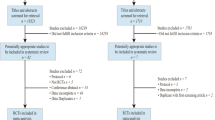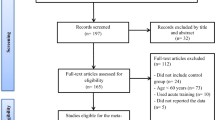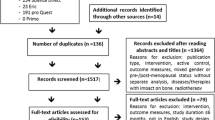Abstract
This systematic review detected only limited positive effects of exercise on bone mineral density in older men. Further, based on the present literature, we were unable to suggest dedicated exercise prescriptions for this male cohort that might differ from recommendations based on studies with postmenopausal women. The primary aim of this systematic review was to determine the effect of exercise on bone mineral density (BMD) in healthy older men. A systematic review of the literature according to the Preferred Reporting Items for Systematic Reviews and Meta-Analyses statement included only randomized or non-randomized controlled trials of exercise training ≥ 6 months with study groups of ≥ eight healthy men aged 50 years or older, not using bone-relevant pharmacological therapy, that determined BMD by dual-energy X-ray absorptiometry. We searched PubMed, Scopus, Web of Science, Cochrane, Science Direct, and Eric up to November 2016. Risk of bias was assessed using the PEDro scale. We identified eight trials with 789 participants (PEDro-score, mean value 6 of 10) which satisfied our eligibility criteria. Studies vary considerably with respect to type and composition of exercise. Study interventions of six trials were considered to be appropriate for successfully addressing BMD in this cohort. Between-group differences were not or not consistently reported by three studies. Three studies reported significant exercise effects on BMD for proximal femur; one of them determined significant differences between the exercise groups. None of the exercise trials determined significant BMD effects at the lumbar spine. Based on the present studies, there is only limited evidence for a favorable effect of exercise on BMD in men. More well-designed and sophisticated studies on BMD in healthy older men have to address this topic. Further, there is a need to define intervention quality standards and implement a universal scoring system that allows this pivotal determinant to be addressed much more intensively.

Similar content being viewed by others
Notes
The rational for this decision is reviewed in the “Study limitations” section of the “Discussion”
However, some authors did not give the corresponding adherence rate, so it is difficult to decide how rigorously this protocol was followed.
However, additional 18-month QCT assessments of the more sensitive trabecular LS determined significant positive effects on volumetric BMD.
References
Kemmler W, Bebenek M, Kohl M, Von Stengel S (2015) Exercise and fractures in postmenopausal women. Final results of the controlled Erlangen Fitness and Osteoporosis Prevention Study (EFOPS). Osteoporos Int 26:2491–2499
Kemmler W, Haberle L, von Stengel S (2013) Effects of exercise on fracture reduction in older adults : a systematic review and meta-analysis. Osteoporos Int 24:1937–1950
Kelley GA, Kelley KS, Kohrt WM (2012) Effects of ground and joint reaction force exercise on lumbar spine and femoral neck bone mineral density in postmenopausal women: a meta-analysis of randomized controlled trials. BMC Musculoskelet Disord 13:177
Marques EA, Mota J, Carvalho J (2011) Exercise effects on bone mineral density in older adults: a meta-analysis of randomized controlled trials. Age 34:1493–1515
Martyn-St James M, Carroll S (2011) Effects of different impact exercise modalities on bone mineral density in premenopausal women: a meta-analysis. J Bone Miner Metab 28:251–267
Zhao R, Zhao M, Xu Z (2015) The effects of differing resistance training modes on the preservation of bone mineral density in postmenopausal women: a meta-analysis. Osteoporos Int 26:1605–1618
Cawthon PM, Shahnazari M, Orwoll ES, Lane NE (2016) Osteoporosis in men: findings from the Osteoporotic Fractures in Men Study (MrOS). Ther Adv Musculoskelet Dis 8:15–27
Cummings SR, Browner WS, Bauer D, Stone K, Ensrud K, Jamal S, Ettinger B (1998) Endogenous hormones and the risk of hip and vertebral fractures among older women. Study of Osteoporotic Fractures Research Group. N Engl J Med 339:733–738
Cummings SR, Cawthon PM, Ensrud KE, Cauley JA, Fink HA, Orwoll ES, Osteoporotic Fractures in Men Research G, Study of Osteoporotic Fractures Research G (2006) BMD and risk of hip and nonvertebral fractures in older men: a prospective study and comparison with older women. J Bone Miner Res 21:1550–1556
Bolam KA, van Uffelen JG, Taaffe DR (2013) The effect of physical exercise on bone density in middle-aged and older men: a systematic review. Osteoporos Int 24:2749–2762
Kelley GA, Kelley KS, Tran ZV (2000) Exercise and bone mineral density in men: a meta-analysis. J Appl Physiol 88:1730–1736
Kelley GA, Kelley KS, Kohrt WM (2013) Exercise and bone mineral density in men: a meta-analysis of randomized controlled trials. Bone 53:103–111
Nichols JF, Rauh MJ (2011) Longitudinal changes in bone mineral density in male master cyclists and nonathletes. J Strength Cond Res 25:727–734
Kemmler W, von Stengel S (2011) Exercise and osteoporosis-related fractures: perspectives and recommendations of the sports and exercise scientist. Phys Sportmed 39:142–157
de Morton NA (2009) The PEDro scale is a valid measure of the methodological quality of clinical trials: a demographic study. Aust J Physiother 55:129–133
Sherrington C, Herbert RD, Maher CG, Moseley AM (2000) PEDro. A database of randomized trials and systematic reviews in physiotherapy. Man Ther 5:223–226
Kemmler W, von Stengel S (2016) Osteoporose. In: Mooren C, Knapp G, Reimers CD (eds) Prävention und Therapie durch Sport. Urban und Fischer, München
Allison SJ, Folland JP, Rennie WJ, Summers GD, Brooke-Wavell K (2013) High impact exercise increased femoral neck bone mineral density in older men: a randomised unilateral intervention. Bone 53:321–328
Bolam KA, Skinner TL, Jenkins DG, Galvao DA, Taaffe DR (2015) The osteogenic effect of impact-loading and resistance exercise on bone mineral density in middle-aged and older men: a pilot study. Gerontology 62:22–32
Helge EW, Andersen TR, Schmidt JF, Jorgensen NR, Hornstrup T, Krustrup P, Bangsbo J (2014) Recreational football improves bone mineral density and bone turnover marker profile in elderly men. Scand J Med Sci Sports 24(Suppl 1):98–104
Huuskonen J, Väisänen SB, Kröger H, Jurvelin JS, Alhava A, Rauramaa R (2001) Regular physical exercise and bone mineral density: a four-year controlled randomized trial in middle-aged men. Osteoporos Int 12:249–355
Kukuljan S, Nowson CA, Sanders KM, Nicholson GC, Seibel MJ, Salmon J, Daly RM (2011) Independent and combined effects of calcium-vitamin D3 and exercise on bone structure and strength in older men: an 18-month factorial design randomized controlled trial. J Clin Endocrinol Metab 96:955–963
McCartney N, Hicks AL, Martin J, Webber CE (1995) Long-term resistance training in the elderly: effects on dynamic strength, exercise capacity, muscle, and bone. J Gerontol 50A:B97–B104
Whiteford J, Ackland TR, Dhaliwal SS, James AP, Woodhouse JJ, Price R, Prince RL, Kerr DA (2010) Effects of a 1-year randomized controlled trial of resistance training on lower limb bone and muscle structure and function in older men. Osteoporos Int 21:1529–1536
Woo J, Hong A, Lau E, Lynn H (2007) A randomised controlled trial of Tai Chi and resistance exercise on bone health, muscle strength and balance in community-living elderly people. Age Ageing 36:262–268
Steele J, Fisher J, Giessing J, Gentil P (2017) Clarity in reporting terminology and definitions of set end points in resistance training. Muscle Nerve 368-374:368–374
Baron RE (1997) Anatomy and ultrastructure of bone. In: Baron RE (ed) Osteoporosis—fundamentals of clinical practice. Lippincott-Raven, New York, pp 3–10
Christen P, Ito K, Ellouz R, Boutroy S, Sornay-Rendu E, Chapurlat RD, van Rietbergen B (2014) Bone remodelling in humans is load-driven but not lazy. Nat Commun 5:4855
Joober R, Schmitz N, Annable L, Boksa P (2012) Publication bias: what are the challenges and can they be overcome? J Psychiatry Neurosci 37:149–152
Schwarzer G, Carpenter JR, Rücker G (2015) Small-study effects in meta-analysis. In: Schwarzer G (ed) Meta-analysis with R. Springer-Verlag, Heidelberg, pp 107–141
Borenstein M, Hedges LV, Higgins JPT, Rothstein HR (2009) When does it make sense to perform a meta-analysis. In: Borenstein M (ed) Introduction to meta-analysis. John Wiley & Son, Chicester
von Stengel S, Kemmler W, Lauber D, Weineck J, Kalender WA, Engelke K (2005) Power training is more effective than strength training to maintain bone mineral density in postmenopausal woman. J Appl Physiol 99:181–188
Greco T, Zangrillo A, Biondi-Zoccai G, Landoni G (2013) Meta-analysis: pitfalls and hints. Heart Lung Vessel 5:219–225
Kukuljan S, Nowson CA, Sanders K, Daly RM (2009) Effects of resistance exercise and fortified milk on skeletal muscle mass, muscle size, and functional performance in middle-aged and older men: an 18-mo randomized controlled trial. J Appl Physiol 107:1864–1873
Kelley GA, Kelley KS, Vu Tran Z (2002) Exercise and lumbar spine bone mineral density in postmenopausal women: a meta-analysis of individual patient data. J Gerontol 57A:M599–M604
Martyn-St. James M, Caroll S (2006) High intensity exercise training and postmenopausal bone loss: a meta-analysis. Osteoporos Int 17:1225–1240
Martyn-St James M, Carroll S (2009) A meta-analysis of impact exercise on postmenopausal bone loss: the case for mixed loading exercise programmes. Br J Sports Med 43:898–908
Wallace BA, Cumming RG (2000) Systematic review of randomized trials of the effect of exercise on bone mass in pre- and postmenopausal women. Calcif Tissue Int 67:10–18
Martyn-St James M, Carroll S (2006) Progressive high-intensity resistance training and bone mineral density changes among premenopausal women: evidence of discordant site-specific skeletal effects. Sports Med 36:683–704
Gomez-Bruton A, Gonzalez-Aguero A, Gomez-Cabello A, Casajus JA, Vicente-Rodriguez G (2013) Is bone tissue really affected by swimming? A systematic review. PLoS One 8:e70119
Gomez-Cabello A, Ara I, Gonzalez-Aguero A, Casajus JA, Vicente-Rodriguez G (2012) Effects of training on bone mass in older adults: a systematic review. Sports Med 42:301–325
Martyn-St James M, Carroll S (2008) Meta-analysis of walking for preservation of bone mineral density in postmenopausal women. Bone 43:521–531
Wolff I, van Croonenborg JJ, Kemper HC, Kostense PJ, Twisk JW (1999) The effect of exercise training programs on bone mass: a meta-analysis of published controlled trials in pre- and postmenopausal women. Osteoporos Int 9:1–12
Ernst E (1998) Exercise for female osteoporosis. A systematic review of randomised clinical trials. Sports Med 25:359–368
Casez JP, Fischer S, Stussi E, Stalder H, Gerber A, Delmas PD, Colombo JP, Jaeger P (1995) Bone mass at lumbar spine and tibia in young males—impact of physical fitness, exercise, and anthropometric parameters: a prospective study in a cohort of military recruits. Bone 17:211–219
Leichter I, Simkin A, Margulies JY, Bivas A, Steinberg R, Giladi M, Milgrom C (1989) Gain in mass density of bone following strenguous physical activity. J Orthop Res 7:86–90
Sharp MA, Knapik JJ, Walker LA, Burrell L, Frykman PN, Darakjy SS, Lester ME, Marin RE (2008) Physical fitness and body composition after a 9-month deployment to Afghanistan. Med Sci Sports Exerc 40:1687–1692
Eriksen EF (2010) Cellular mechanisms of bone remodeling. Rev Endocr Metab Disord 11:219–227
Nikander R, Sievanen H, Heinonen A, Daly RM, Uusi-Rasi K, Kannus P (2010) Targeted exercise against osteoporosis: a systematic review and meta-analysis for optimising bone strength throughout life. BMC Med 8:47
Kemmler W, Engelke K, von Stengel S (2016) Long-term exercise and bone mineral density changes in postmenopausal women-are there periods of reduced effectiveness? J Bone Miner Res 31:215–222
Guglielmi G, Floriani I, Torri V, Li J, van Kuijk C, Genant HK, Lang TF (2005) Effect of spinal degenerative changes on volumetric bone mineral density of the central skeleton as measured by quantitative computed tomography. Acta Radiol 46:269–275
Moher D, Liberati A, Tetzlaff J, Altman DG (2009) Preferred reporting items for systematic reviews and meta-analyses: the PRISMA statement. Ann Intern Med 151(264–269):W264
Acknowledgements
We would like to thank the Friedrich-Alexander University of Erlangen-Nürnberg for funding the study.
Funding
The study was funded by the Institute of Medical Physics, Friedrich-Alexander University of Erlangen-Nürnberg.
Author information
Authors and Affiliations
Corresponding author
Ethics declarations
Conflicts of interest
None.
Electronic supplementary material
ESM 1
(DOC 64 kb)
Rights and permissions
About this article
Cite this article
Kemmler, W., Shojaa, M., Kohl, M. et al. Exercise effects on bone mineral density in older men: a systematic review with special emphasis on study interventions. Osteoporos Int 29, 1493–1504 (2018). https://doi.org/10.1007/s00198-018-4482-0
Received:
Accepted:
Published:
Issue Date:
DOI: https://doi.org/10.1007/s00198-018-4482-0




